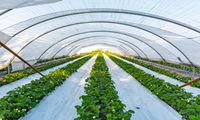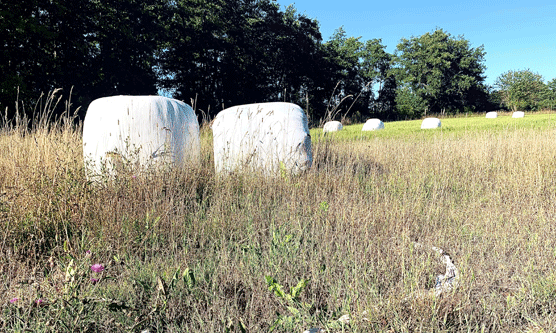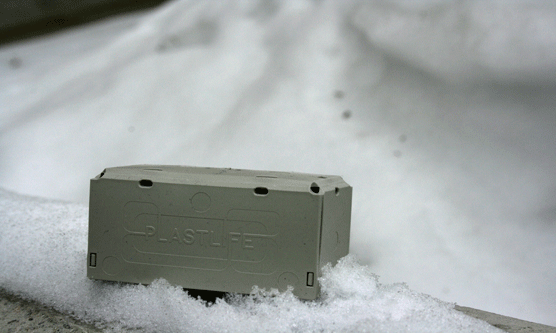
Tunnel farming. © Photo: Adobe Stock.
PlastLIFE, a key player in the circular economy for plastics, has unveiled some of the project’s preliminary results, which focus on agricultural plastics, recycling promotion, and litter prevention. These findings were shared at a seminar held on April 24 in Joensuu and online.
Key innovations and findings:
Turning agricultural plastic waste into new products
Agriculture relies heavily on plastics for mulching, plant supports, irrigation systems, and silage wraps. However, the recycling of agricultural plastics is currently inadequate, with few suitable applications for the resulting waste.

Silage bales and waste plastic © Photo: Annika Johansson / Syke
Karelia University of Applied Sciences (Karelia UAS) has developed an innovative product made from agricultural plastic waste. Introduced by Simo Paukkunen, this new product can be locally manufactured and used in constructing various elements. Karelia is continuing to refine and develop this product.

The Karelia UAS team has created a versatile product from agricultural plastic waste, which can be locally produced for various construction purpose. © Photo Karelia UAS
Liquid biodegradable mulch as an alternative
Researcher Marleena Hagner from the Natural Resources Institute Finland (Luke) presented alternatives to plastic mulches used in agriculture and horticulture. Luke is testing liquid biodegradable mulch in various environments, to help preventing weeds and pests while reducing plastic pollution in the soil.
For more information and detailed insights, watch the embedded video from Luke:
Challenges and opportunities of bioplastics
The recyclability of bioplastics in biogas plants is under investigation. Nelli Pitkänen explained that current research by the Finnish Biocycle and Biogas Association is examining the amount of plastic in the biogas process and whether bio-bags decompose during digestion. This research aims to enhance the efficiency of biogas production and better integrate plastics into the process.
Muovipoli, in collaboration with Aalto University and the New Plastics Center (NPC), is developing innovations in bio- and recycled plastics. This initiative aims to promote biomaterial innovations and product development in Finland. Sauli Eerola highlighted the importance of strengthening collaboration and networking to advance the development and adoption of new materials.
Campaigns to stop littering
Maarit Sallinen from the North Karelia Martha Organization discussed Marthas’ activities promoting the circular economy of plastics. The organization reaches millions of Finns annually through communication efforts that include counseling, lectures, and courses on plastic sorting and recycling.
Keep the Archipelago Tidy Association is running a campaign for the second year to raise awareness about litter traveling with stormwater from street drains to waterways. According to Kiia Palo, colorful fish stickers will appear on manhole covers in 19 cities this fall. The consumer-targeted "Mahanpuruja muovista” (Bellyache from plastics) campaign is funded by the PlastLIFE project.
This seminar provided a comprehensive look at innovative solutions aimed at reducing the use of fossil-based raw materials in plastics, emphasizing recycling into new products, biodegradable alternatives, and plastic waste recycling rather than littering.
More information
Senior research scientist Helena Dahlbo, Finnish Environment Institute, firstname.lastname@syke.fi
Co-ordinator Waltteri Heikkilä, Finnish Environment Institute, firstname.lastname@syke.fi